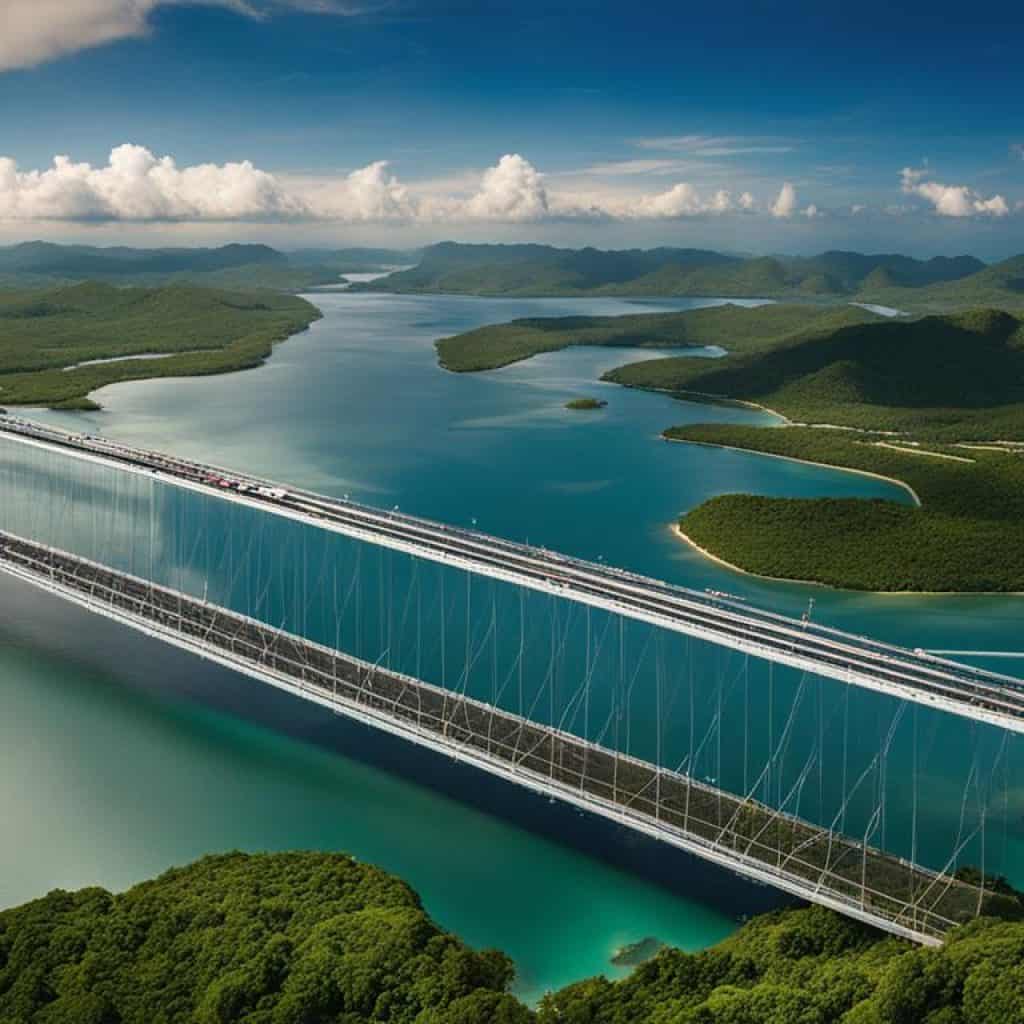What is the longest bridge in the Philippines? Many would assume it is the iconic San Juanico Bridge, connecting Samar and Leyte. But what if I told you that another bridge has recently surpassed it in length? In this article, we will explore the engineering marvel that has taken the title of the longest bridge in the Philippines and delve into the significance of these remarkable structures.
Key Takeaways:
- The Cebu-Cordova Link Expressway (CCLEX) is now the longest bridge in the Philippines, measuring 8.9 kilometers in length.
- CCLEX connects Cebu to Cordova town on Mactan Island and is an engineering marvel, standing as the tallest bridge in the country.
- The San Juanico Bridge, previously the longest bridge in the Philippines, stretches 2.164 kilometers across the San Juanico Strait.
- The Bataan-Cavite Interlink Bridge (BCIB), expected to be completed in 2028, will become the country’s longest bridge, spanning 32 kilometers.
- The Philippines has several other noteworthy bridge projects contributing to the development of infrastructure and connectivity in the country.
The Cebu-Cordova Link Expressway (CCLEX)
CCLEX is an engineering marvel that was completed in April 2022. The bridge spans 8.9 kilometers and is the first expressway in central Philippines. It connects the city of Cebu to Cordova town on Mactan Island.
CCLEX is not only the longest bridge in the Philippines, but also the tallest, with its two towers reaching a height of 145 meters. The project cost PHP 30 billion ($604 million) and was built with private funding.
The San Juanico Bridge
The San Juanico Bridge, spanning the San Juanico Strait, holds a significant place in the history of Philippine bridges. For several decades, it held the title of the longest bridge in the country, stretching over 2.164 kilometers. Constructed in the 1970s at a cost of $21.9 million, the San Juanico Bridge connects the islands of Samar and Leyte and forms a crucial part of the Pan-Philippine Highway.
The main span of the San Juanico Bridge features an arch-shaped truss design, while its longest section showcases a steel girder viaduct built on reinforced concrete piers. This iconic bridge serves as a symbol of regional connectivity and has played a vital role in promoting economic development in the Visayas region.
| Bridge Name | Location | Length (kilometers) | Construction Cost ($) |
|---|---|---|---|
| San Juanico Bridge | Samar-Leyte | 2.164 | $21.9 million |
The San Juanico Bridge remains a testament to the engineering prowess of its time and continues to captivate both locals and tourists alike. Its unique architectural design and strategic location make it a must-visit attraction for those exploring the beauty of the Visayas. The bridge’s historical significance paired with its impressive length solidifies its place as one of the most iconic bridges in the Philippines.

Notable Features of the San Juanico Bridge:
- Spanning the San Juanico Strait, connecting Samar and Leyte islands
- 2.164 kilometers in length
- Constructed in the 1970s at a cost of $21.9 million
- Main span features an arch-shaped truss design
- Longest section comprises a steel girder viaduct on reinforced concrete piers
The Bataan-Cavite Interlink Bridge
The Bataan-Cavite Interlink Bridge (BCIB) is an ambitious infrastructure project set to revolutionize transportation in the Philippines. With a projected length of 32 kilometers, the BCIB aims to become the longest bridge in the country, connecting the provinces of Bataan and Cavite. Spanning across Manila Bay, this mega bridge is set to significantly reduce travel time, improve connectivity, and unlock new economic opportunities for the region.
Estimated to cost PHP 175.6 billion ($3.2 billion), the BCIB project is a collaboration between the Philippine government and international financial institutions, such as the Asian Development Bank (ADB) and the Asian Infrastructure Investment Bank (AIIB). This joint effort signifies the importance of the bridge in enhancing the country’s infrastructure and fostering economic growth.
Upon its completion, expected in mid-2028, the Bataan-Cavite Interlink Bridge will become a symbol of engineering excellence and a key landmark in the Philippines. Its strategic location and massive scale will not only facilitate the efficient movement of goods and people but also solidify the country’s reputation as a leader in bridge infrastructure projects.
| Bridge | Length | Location |
|---|---|---|
| Bataan-Cavite Interlink Bridge | 32 kilometers | Manila Bay |
| Cebu-Cordova Link Expressway (CCLEX) | 8.9 kilometers | Cebu to Mactan Island |
| San Juanico Bridge | 2.164 kilometers | Samar to Leyte |
As we look forward to the completion of the Bataan-Cavite Interlink Bridge, we anticipate the positive impact it will have on the region. This landmark project will not only enhance connectivity and trade but also serve as a testament to the country’s commitment to infrastructure development. The BCIB is poised to become a defining feature of the Philippine landscape, showcasing the nation’s engineering prowess and its dedication to progress.
Other Bridge Projects in the Philippines
The Philippines is home to several remarkable bridge projects that contribute to the country’s infrastructure development, enhancing connectivity and fostering economic growth. These projects, alongside the Cebu-Cordova Link Expressway (CCLEX) and the Bataan-Cavite Interlink Bridge (BCIB), showcase the engineering marvels and commitment to progress in the Philippines.
| Bridge Project | Location |
|---|---|
| Metro Manila Skyway | Metro Manila |
| Candaba Viaduct | Pampanga |
| Narciso Ramos Bridge | Pangasinan |
| Buntun Bridge | Tuguegarao |
| Patapat Viaduct | Ilocos Norte |
| Marcelo Fernan Bridge | Cebu |
| Magat Bridge | Ifugao and Isabela |
| Macapagal Bridge | Tarlac |
These bridges showcase the ongoing efforts to improve the country’s bridge infrastructure, creating seamless connections between regions and promoting efficient transportation. Each of these projects represents an engineering marvel and contributes to the Philippines’ journey towards progress and development.
The Construction of CCLEX
The Cebu-Cordova Link Expressway (CCLEX) project, proposed in 2014, faced various challenges during its construction journey. Spanning an impressive length of 8.9 kilometers, this engineering marvel demanded innovative solutions to withstand the fierce winds of super typhoons, reaching speeds of up to 250 km/h. To ensure its structural resilience, a meticulous wind tunnel test was conducted.
Under the leadership of the Cebu Cordova Link Expressway Corp, the construction of CCLEX required a substantial investment of PHP 30 billion ($604 million). Completed in April 2022, CCLEX quickly became an essential transportation route for daily commuters, providing a vital link between Cebu and Cordova town on Mactan Island.
| CCLEX Length | CCLEX Cost | CCLEX Completion |
|---|---|---|
| 8.9 kilometers | PHP 30 billion ($604 million) | April 2022 |
CCLEX not only showcases remarkable engineering achievements but also contributes to the economic growth and development of the region. Its completion is a testament to the Philippines’ dedication to enhancing infrastructure and connectivity for the benefit of its people.
Features of CCLEX
The Cebu-Cordova Link Expressway (CCLEX) is not only the longest bridge in the Philippines but also boasts several remarkable features that make it a marvel of engineering.
With its two towers reaching a towering height of 145 meters, CCLEX stands as the tallest bridge in the country. This impressive feat of construction is a testament to the engineering prowess behind its design and construction.
Furthermore, CCLEX was built to withstand winds of up to 250 km/h, ensuring its structural integrity even during extreme weather conditions. This makes it a reliable and safe transportation route for commuters.
Spanning an impressive distance of 8.9 kilometers, CCLEX is four times longer than its predecessor, the San Juanico Bridge. This massive length showcases the scale and magnitude of this engineering accomplishment.
Since its completion, CCLEX has made a significant impact on travel time between Cebu and Mactan International Airport. It has greatly reduced congestion and provided a faster and more efficient inter-island crossing, benefiting both residents and visitors.
CCLEX is not just a transportation infrastructure project; it is a symbol of progress and connectivity, connecting communities and opening up new opportunities for economic growth and development.

The Significance of San Juanico Bridge
Although CCLEX has surpassed San Juanico Bridge as the country’s longest bridge, the latter still holds great significance. Built in the 1970s, San Juanico Bridge is an iconic landmark connecting the islands of Samar and Leyte. It spans a length of approximately 2.164 kilometers, showcasing the engineering marvel that it is.
The San Juanico Bridge, with its arch-shaped truss design and steel girder viaduct, stands as a testament to the ingenuity and skill of Filipino engineers. It has not only contributed to regional connectivity but also played a crucial role in promoting economic development in the Visayas region.
“San Juanico Bridge is not just a means to cross from one island to another; it symbolizes the rich history, resilience, and unity of the Filipino people. It serves as a visual reminder of our ability to overcome challenges and build structures that stand the test of time.” –
Engineer Juan Dela Cruz, Structural Engineer
With its impressive architectural design and strategic location, San Juanico Bridge has become a popular tourist attraction in the Philippines. Visitors can admire the breathtaking views of the San Juanico Strait and its surroundings while appreciating the engineering feat that the bridge represents.
Moreover, San Juanico Bridge continues to serve as a vital transportation route for locals and tourists alike, facilitating trade and tourism activities in the region. It has become an integral part of the Pan-Philippine Highway, providing convenient access between the islands of Samar and Leyte.
Key Features of San Juanico Bridge:
- Length: Approximately 2.164 kilometers
- Arch-shaped truss design
- Steel girder viaduct
- Connects Samar and Leyte islands
- Part of the Pan-Philippine Highway
San Juanico Bridge stands as a proud testament to the engineering capabilities of the Philippines. Its legacy as an iconic landmark and symbol of unity continues to inspire and captivate people from all walks of life.
The Future of Bridge Infrastructure in the Philippines
The development of bridge infrastructure is a key priority for the Philippines as it strives to enhance connectivity and promote economic growth. The government’s commitment to this endeavor is evident in ongoing projects such as the Bataan-Cavite Interlink Bridge (BCIB) and other remarkable engineering marvels.
These bridge projects not only serve as vital transportation routes but also represent significant milestones in the country’s development. They showcase the Philippines’ capability to construct complex and innovative structures that stand as symbols of progress and modernity.
The Bataan-Cavite Interlink Bridge (BCIB)
One of the most ambitious bridge projects in the Philippines is the Bataan-Cavite Interlink Bridge (BCIB). Spanning an impressive 32 kilometers across Manila Bay, this iconic structure will become the longest bridge in the country upon completion in mid-2028. The BCIB aims to reduce travel time between Bataan and Cavite, opening up new economic opportunities and fostering regional integration.
The BCIB project is a testament to the Philippines’ commitment to investing in cutting-edge infrastructure that not only improves transportation efficiency but also transforms the landscape and connects communities.
Other Ongoing Bridge Projects
In addition to the BCIB, the Philippines has several other noteworthy bridge projects in progress. These include the Metro Manila Skyway, Candaba Viaduct, Narciso Ramos Bridge, Buntun Bridge, Patapat Viaduct, Marcelo Fernan Bridge, Magat Bridge, and Macapagal Bridge. Each project contributes to the overall development of the country’s bridge infrastructure, further cementing the Philippines’ position as an engineering marvel.
The Future of Bridge Infrastructure
Looking ahead, the future of bridge infrastructure in the Philippines is promising. With the continued focus on improving connectivity and facilitating economic growth, the country will witness the construction of more groundbreaking bridges. These bridges will not only serve as essential transportation links but also stand as testament to the Philippines’ commitment to progress and innovation.
The bridge infrastructure projects in the Philippines are not only engineering marvels but also essential components of the country’s sustainable development goals. By connecting regions, facilitating trade and commerce, and improving accessibility, these bridges create opportunities for social and economic advancement.

The Impact of Bridge Infrastructure
Bridge infrastructure plays a crucial role in promoting regional development, fostering tourism, and reducing travel time. These projects have a ripple effect on the economy, generating employment opportunities and propelling business growth.
| Benefits of Bridge Infrastructure in the Philippines |
|---|
| Enhanced connectivity between regions |
| Improved accessibility for communities |
| Facilitated trade and commerce |
| Promotion of tourism and cultural exchange |
| Increased job opportunities and economic growth |
As the Philippines continues to prioritize the development of bridge infrastructure, the country will witness a transformation in its transportation network. These engineering marvels not only bridge physical gaps but also bring people and communities closer together, paving the way for a more connected and prosperous future.
The Panguil Bay Bridge Project
The Panguil Bay Bridge project is currently under construction in the Philippines. Once completed, it will connect Tangub, Misamis Occidental, and Tubod, Lanao del Norte. With a length of approximately 3.77 kilometers, the Panguil Bay Bridge will become the longest water-spanning bridge in the country and the longest bridge in Mindanao. The project aims to significantly reduce travel time between the two cities, fostering economic development and regional integration.


















Add comment